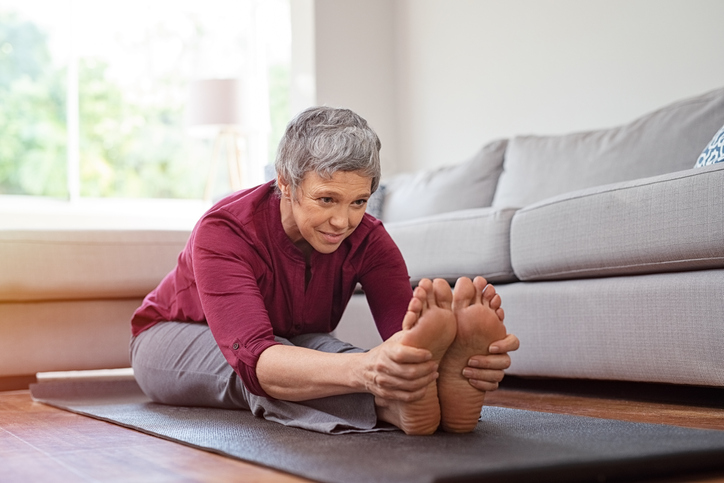
Oh, my aching feet! Learn about common podiatry issues impacting older adults.
Our feet will carry us in the vicinity of 110,000 miles over the course of our lifetime – that’s 216,262,500 steps! It’s certainly no wonder that as we age, our feet may start to see a host of challenges. Examples of the more widespread foot issues for the elderly include:
- Arthritis: Osteoarthritis affects various joints throughout the body, and the feet are not an exception. Women are more prone to be diagnosed with arthritis as they age – 16% of senior women as compared to 10% of senior men. Additional risk factors consist of past injury to the foot or ankle, obesity, bunions, and hammertoe.
- Gout: A specific type of arthritis, gout is an autoimmune disease that can cause excruciating discomfort due to accumulated uric acid crystals surrounding a joint, most often presenting initially in the big toe.
- Dry Skin: Left untreated, dry skin on the feet can lead to discomfort when walking, and allow bacteria to be introduced, bringing about the potential for an infection in the feet. Using moisturizer on the feet regularly as a preventative measure before skin becomes cracked often helps.
- Flat Feet: Arising from stretched ligaments which may occur in the aging process, this disorder produces pain and swelling within the arch of the foot and inner ankle, and in some cases up through the lower back, hip and knee as well. Flat feet can cause a senior to have balance and stability problems and increase the possibility of sprains in the feet and ankles.
- Seborrheic Keratosis: Occasionally described as stucco keratosis, this problem causes lesions to appear on the tops of the ankles, feet, and/or toes which can be mistaken for warts. While not painful, these lesions can cause itching and irritation, particularly when shoes are worn.
- Toenail Changes: As we grow older, toenails thicken and become more brittle, which makes them harder to clip. Nails can also change in color and develop ridges and cracks.
- Circulation: Edema (built-up fluids), medication side effects, diabetes and other conditions may lead to circulation problems for older adults. Swelling, numbness and tingling in the feet and legs are common symptoms of circulatory issues.
- Shortened Achilles Tendon: The Achilles (and other tendons) can lose water in the aging process, which can shorten them while making them significantly less flexible, more susceptible to tears or ruptures and bring about a flatfooted gait.
Any changes in the feet should be brought to the attention of the older adult’s doctor, and it’s always a good idea to arrange routine appointments for your senior loved one with a podiatrist, who is able to provide nail care and keep a close watch for any potential issues.
Live Free Home Health Care, a provider of trusted home care in Plymouth and the surrounding areas, can assist in many ways to make certain older adults’ feet are as healthy as possible, such as:
- Transportation to medical appointments
- Ensuring appropriate nutrition and hydration
- Encouraging safe, physician-authorized physical exercise
- Assessing your home for fall risks
- And much more
Make the first step to improving health for your senior loved one! Live Free Home Health Care, one of the leading providers of home care in Plymouth and the surrounding areas, provides compassionate and reliable care services for area seniors. Contact us at 603-217-0149 to find out more.
